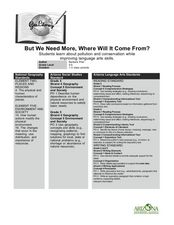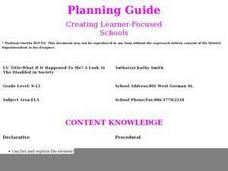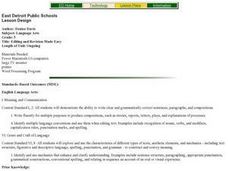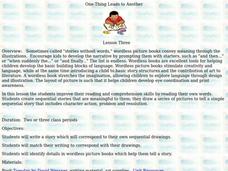Curated OER
Writing: Stamp of Approval
Students write a good title and edit their essay. In this writing instructional activity, students examine several examples of good titles and discuss what makes them effective. Students relate this to the sign on a building and...
Curated OER
But We Need More, Where Will It Come From?
Young scholars write a persuasive letter and create a poster about pollution and conservation. In this pollution and conservation lesson plan, students learn how humans are the number 1 cause of pollution.
Curated OER
The Birth of a Rocky Mountain City and Railroad: Georgetown and the Loop Railroad
Students explore the evolution of a town. For this social studies lesson, students discuss why Georgetown and the Georgetown Loop Railroad were developed and discuss life as a prospector. Students write a letter explaining what life is...
Curated OER
Examining Conflicts At Camp Green Lake
Students complete an essay documenting a conflict present in the novel Holes. They define the six types of literary discussion as a class. After identifying one of these types of conflicts in the novel, students write a five paragraph...
Curated OER
Creating Your Own Ad
Students analyze the effective advertisements in print and Internet ads. In this advertisements lesson, students create a collage of original and repurposed words, graphics, and images of advertisements. Students create a poster for the...
Curated OER
Catch Me If You Can: Over and Under
Students read a story. In this vocabulary skills lesson, students read The Gingerbread Man, use flannel cut outs to re-enact the gingerbread man running over and under.
Curated OER
Whose Voice Do I Hear?
Fifth graders examine the power of voice in writing by completing a story using words following a particular voice. They take simple nursery rhymes, then attempt to put their own voice to a revised version. An interesting lesson on writing!
Curated OER
Print Advertising: Past and Present
Twelfth graders identify the way advertisements are constructed to influence out lives and our values. They review advertisements from the 1800s and 1900s and how they may have influenced people living in that time. Using this ad, 12th...
Curated OER
What Makes A Face A Face?
High schoolers discuss what enables us to read a face: features, expressions, standards of beauty, age and gender. They discuss what enables us to read motion: repetition, sequence, changes in form and scene.
Curated OER
What If It Happened To Me? A Look At The Disabled in Society
Students examine what it would be like to be disabled. They read literature with characters who have disabilities and discuss how society treats people with disabilities. They write an essay explaining why they are "normal."
Curated OER
Editing and Revision Made Easy
Fifth graders use computer to correct mistakes in written sentences.
Curated OER
Imagining Your Science Fiction Short Story
Twelfth graders brainstorm ideas for their own science fiction story. Using worksheets, they sketch the plot and setting for their story. They create appropriate characters and develop their interactions among each other. They share...
Curated OER
The Classical Period
Sixth graders are introduced to the classical period in music history. After listening to examples, they identify and describe the characteristics of music during this time period and research the main composers. Using the internet,...
Curated OER
Composing Project
Students design, compose, and present short musical compositions for keyboard in this lesson plan meant for the high school choir class. This lesson can be adapted to any time frame, but the author suggests a considerable amount of time...
Curated OER
"Julie of the Wolves"
Fifth graders research life in Alaska and compare life there to their lives in this instructional activity. They read "Julie of the Wolves." They research through the novel and other reference books facts about the Alaskan climate and...
Curated OER
Happy Birthday, Dr. Seuss!
Students examine the life and works of Theodor Seuss Geisel. In groups, they compare and contrast the stories, characters and illustrations he used. They complete a book review on one of the books and share them with other students in...
Curated OER
The Minerva Mosaic of the Library of Congress: Taking a Closer Look
Students interpret historical evidence presented in primary resources. In this symbolism lesson, students examine the Minerva Mosaic of the Library of Congress. Students consider the symbolism of the mosaic.
Curated OER
One Thing Leads to Another
Students analyze the storytelling methods in wordless books. In this visual storytelling lesson plan, students write a story that correspond to a specific wordless picture book. Students create their own wordless picture book after...
Curated OER
The Composer's Blueprint
Students recognize AB and ABA form in music and distinguish between these two forms. They explore meaning of tempo and how to perform accents in written music.
Curated OER
In A Station Of The Metro And A Pact
Young scholars are exposed to two different works of poetry in order to complete a task of comparing and contrasting them. They analyze the poem and identify the juxtaposition. The analysis is compiled by them to make a class report of it.
Curated OER
Editorial Writing: What's On Your Mind
Students write an editorial column for a newspaper. For this journalism lesson, students discuss and analyze editorials in print and broadcast media. Students will compare the differences in these two formats of editorial pieces and then...
Curated OER
Landscapes
Learners explore landforms and landscapes. They demonstrate an appreciation for and examine how to recognize the attributes of landforms and landscapes. Students create a landscape and reflect on their painting.
Curated OER
What is your language?
First graders read a book and recognize words from the book and write sentences based on the book about language. In this language lesson plan, 1st graders also say yes and no in another language.
Curated OER
Information Problem Solving
Middle schoolers review the six steps of conducting research to find out information and to problem solve. This is lesson plan one in a five lesson plan unit.

























